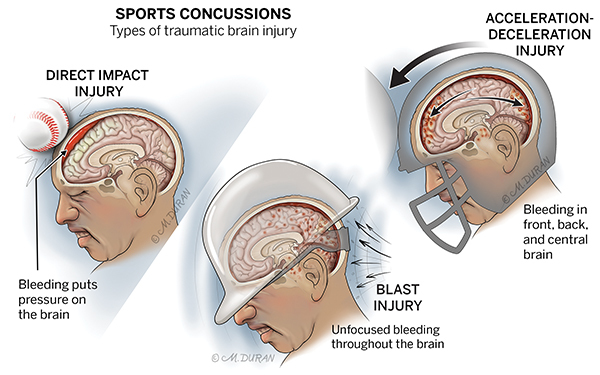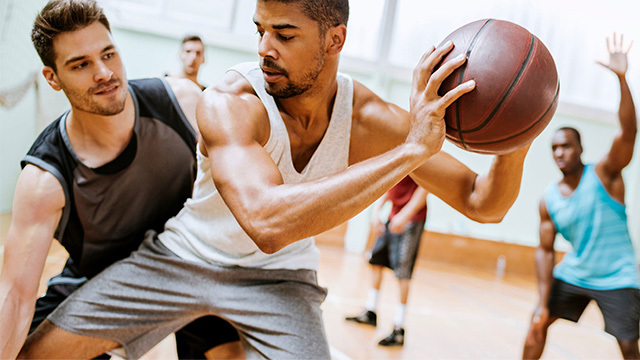About Concussions
A concussion is a brain injury that affects how the brain functions. Changes in brain function are usually temporary and most concussions do not result in loss of consciousness. The injury causing a concussion may include a direct blow to the head, face, neck, or another place on the body that is transmitted to the brain. Anyone who suspects they have a concussion should immediately stop participating in the activity that caused the injury and undergo an evaluation by a medical professional within 48 hours of the injury. Please call 1-833-UT-CARES (1-833-882-2737) to make an appointment with a healthcare provider.
Symptoms of Concussions
A concussion can have a wide variety of symptoms that affect you emotionally, physically, or mentally. Concussions can also disrupt your sleeping habits. The signs and symptoms of a concussion shouldn’t be explained away by any other injury or illness, medication, drug, alcohol, or psychiatric causes.

Emotional symptoms of concussions may include:
- Excessive crying
- Feeling more emotional than usual
- Irritability
- Nervousness
- Sadness
Mental/cognitive symptoms of concussions may include:
- Being forgetful of recent information and conversations
- Confusion about recent events
- Difficulty concentrating
- Disorientation
- Experiencing slowed mental processing
- Feeling mentally “foggy” or slowed down
- Responding slowly to questions
Physical symptoms of concussions may include:
- Balance problems
- Confusion
- Dizziness
- Fatigue
- Headache
- Nausea or vomiting
- Sensitivity to light or noise
- Stunned appearance
- Visual problems
Sleep-related symptoms of concussions may include:
- Difficulty falling asleep
- Drowsiness
- Frequent awakening
- Sleeping more or less than usual
Risk Factors for Sports-Related Concussions
While concussions are most common in high-risk, contact sports, some people are at higher risk.
Risk factors for sports-related concussions may include:
- Age: Youth athletes tend to be more susceptible to concussion injuries.
- Health history: A previous history of concussions or repetitive blows to the head is linked to future concussion.
- Sex: Female athletes have a higher injury rate of concussions compared to male athletes participating in similar sports with similar playing rules.
Treating Sports-Related Concussions at UT Health Austin
Our goal is to provide you with an individualized symptom-management and return-to-play treatment plan that allows you to resume participation in your desired recreational activity, sport, or other physical interaction. Depending on the severity of your concussion, your treatment may include diagnostic testing and patient education involving prevention and recognition of potential complications of concussions, including post-concussion syndrome and second impact syndrome.
Care Team Approach
At UT Health Austin, we take a multidisciplinary approach to your care. This means you will benefit from the expertise of multiple specialists across a variety of disciplines caring for you in one place to avoid having to schedule multiple appointments with providers at locations all over the city. The Sports and Injury Clinic care team includes orthopedic surgeons, sports medicine physicians, physiatrists, physical therapists, chiropractors, nurse practitioners, dietitians, social workers, and more, who work together to help you get back to the things in your life that matter most to you.
We also collaborate with our colleagues at The University of Texas at Austin and the Dell Medical School to utilize the latest research, diagnostic, and treatment techniques, allowing us to provide you with comprehensive, whole-person orthopedic care to help you meet your goals. Treatment may include non-surgical interventions, such as lifestyle modifications, physical therapy, or medication and injections, or surgery may be the best course of action.
Learn More About Your Care Team

Musculoskeletal Institute
Health Transformation Building, 9th Floor
1601 Trinity Street, Bldg. A, Austin, Texas 78712
1-833-UT-CARES (1-833-882-2737)
Get Directions

Sports and Injury Clinic
Health Transformation Building, 9th Floor
1601 Trinity Street, Bldg. A, Austin, Texas 78712
1-833-UT-CARES (1-833-882-2737)
Get Directions